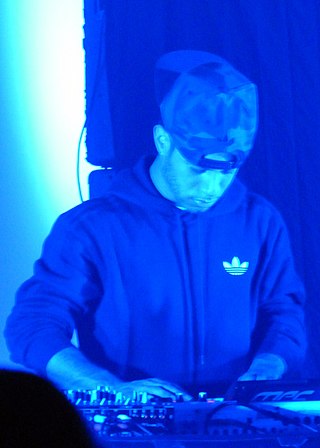
The music of Kenya is very diverse, with multiple types of folk music based on the variety over 50 regional languages.
Popular music of the United Kingdom in the 1980s built on the post-punk and new wave movements, incorporating different sources of inspiration from subgenres and what is now classed as world music in the shape of Jamaican and Indian music. It also explored the consequences of new technology and social change in the electronic music of synthpop. In the early years of the decade, while subgenres like heavy metal music continued to develop separately, there was a considerable crossover between rock and more commercial popular music, with a large number of more "serious" bands, like The Police and UB40, enjoying considerable single chart success.
There are several subgenres of reggae music including various predecessors to the form.
Celtic fusion is an umbrella term for any modern music which incorporates influences considered "Celtic", or Celtic music which incorporates modern music. It is a syncretic musical tradition which borrows freely from the perceived "Celtic" musical traditions of all the Celtic nations, as well as from all styles of popular music, it is thus sometimes associated with the Pan-Celtic movement. Celtic fusion may or may not include authentic traditional music from any one tradition under the Celtic umbrella, but its common characteristic is the inspiration by Celtic identity.

Genge music is a genre of hip-hop music influenced by dancehall, originating from Nairobi, Kenya in the 1990s. The term "Genge" was coined by producer Clemo and popularized by Kenyan rappers Jua Cali and Nonini at Calif Records. The genre is commonly performed in Sheng, a mixture Swahili, English and various local dialects. The word "Genge" itself comes from Sheng slang, meaning "a group or a mass of people."

Ogopa Deejays are a Kenyan music production team and record label formed in the late 1990s who gained regional fame and popularity due to standards of their production work.
Issah Mmari Wangui, better known by his stage name E-Sir, was a Kenyan hip hop artist. He was the elder brother to fellow Kenyan rapper Habib. He was famous for his deft lyrical ability and command of the Swahili language. The phenomenal popularity of his music disproved the myth that Kenyan music could never compete with imported pop. Even long after his death, he is still widely regarded as one of the best rappers to have emerged on the Kenyan hip hop scene. In 2017, he got nominated for the Mdundo Awards for Most Downloaded Hip-Hop Artist. At the age of only 21, after only a brief but most iconic presence in Kenyan music, he died in a car accident in 2003. Boomba Train was his last hit song.
East African urban music is a popular music genre of the three countries customarily grouped as "East Africa": Kenya, Tanzania and Uganda. The genre is basically an offshoot of western popular music, particularly hip hop and funk, somewhat influenced by more traditional African music. Kapuka, genge, and bongo flava are some of the subgenres which have arisen in this style.
K-South was a Kenyan hip-hop duo made up of "Bamboo" and "Doobeez'", now known as "Abbas Kubaff". Founded in 1995, K-South is among the most notable pioneers of the genre in Kenya. The name is an abbreviation of Kariobangi South, the Nairobi neighbourhood where they were based. The group used both English and Swahili raps in their music.
Calif Records is a Kenyan record label based in Nairobi's California estate, known for the Genge genre of music.

The Kisima Music Awards is an annual awards program that recognises musical talent in East Africa. Despite being Kenyan-based the scheme awards artists from a variety of countries, predominantly Kenya, Uganda and Tanzania, and incorporates a range of music genres.
Kleptomaniax is a rap group from Nairobi, Kenya. The group consists of three members: Roba, Collo and Nyashinski.

Abraham Orellana, better known as his stage name AraabMuzik, is an American record producer and DJ. He made a name for himself by performing beats and instrumentals live and in real time on a AkaiPro Music Production Center (MPC) drum machine. He uses MPC to produce rapid, rhythmic drum patterns and creates melodies with samples and other sounds.
Merenhouse, merenrap or electronic merengue,Mambo o Mambo de Calle is a style of Dominican merengue music formed by blending with dancehall reggae and hip hop. The mix of Latin music, house music and dancehall started in NYC in the late 1980s.
"Party Don't Stop" is the debut single by Kenyan alternative hip hop group Camp Mulla, featuring Kenyan rapper Collo. It peaked at #2 on 98.4 Capital FM's radio playlist Hits Not Homework and at #13 on Homeboyz Radio's HitList, making it Camp Mulla's most successful single so far. The single won an award for "Teeniez' Group or Collabo" at the 2012 Chaguo La Teeniez Awards.

Judith Nyambura Mwangi, who is better known as Avril, is a Kenyan singer, songwriter, actress and entrepreneur. She was formerly signed to Ogopa Deejays, one of the leading music production and record labels in Kenya. As a singer, she is known for the singles "Mama", "Kitu Kimoja", "Chokoza" and "Hakuna Yule". As an actress, she is best known for playing Miss B'Have on Shuga: Love, Sex, Money (2012). Avril's contributions to the Kenyan entertainment industry have earned her one Nzumari Award, one Kisima Music Award, one Golden Mic Award and two Chaguo La Teeniez Awards.
Odi pop is a Kenyan music style which involves localized hip hop and draws influences from reggae and Dancehall music to build on an African Rhythm base performed in sing-along rap in heavy Kiswahili/Sheng language. There are several sub-genres stemming from this umbrella term including Gengeton, Dabonge, Debe and others. The music is spearheaded by Kenyan youths and most of them are pursuing their careers as music groups opposed to solo careers.




